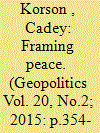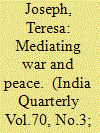| Srl | Item |
| 1 |
ID:
138981


|
|
|
|
|
| Summary/Abstract |
Despite conducting sixty-six peacekeeping missions, the United Nations (UN) must repeatedly justify the necessity and wisdom of continuing these operations to the international community. Domestic success is contingent to a large degree on the willingness of citizens to cooperate with peacekeepers. Consequently, public perception in both the host country and abroad has become crucial to the continuation and maintenance of UN Peacekeeping Operations (UNPKO). A discourse analysis of domestic and international newspapers, radio transcripts, and television broadcasts about contemporaneous UNPKOs in Haiti and Côte d’Ivoire reveals staggering disparities. Diverging interpretations of mission mandates, violence, censorship, and colonial practices contribute to the way in which peacekeeping missions are perceived. This article identifies how current UNPKOs are perceived domestically and internationally and emphasises the role of these perceptions as a basis for evaluating and improving these operations.
|
|
|
|
|
|
|
|
|
|
|
|
|
|
|
|
| 2 |
ID:
132907


|
|
|
|
|
| Publication |
2014.
|
| Summary/Abstract |
Technological developments over recent years have ensured that the mainstream mass media will play a growing role in social and political processes, and in shaping perceptions and policies relating to domestic as well as international conflicts. Keeping in perspective the potential capability of the news media in situations of conflict and conflict resolution, this article maps the underlying trends in the role of the mainstream international news media in contemporary conflicts, and the issues and challenges that characterise media coverage of such issues. Identifying some of these trends to be-the reflection of the dominant discourse, framing of news along official lines, dehumanising language of war, media management by governments, selective reporting, demonisation of enemies, and so on-the article throws light on the concept of 'peace journalism' as an alternative to conventional news coverage of conflict.
|
|
|
|
|
|
|
|
|
|
|
|
|
|
|
|